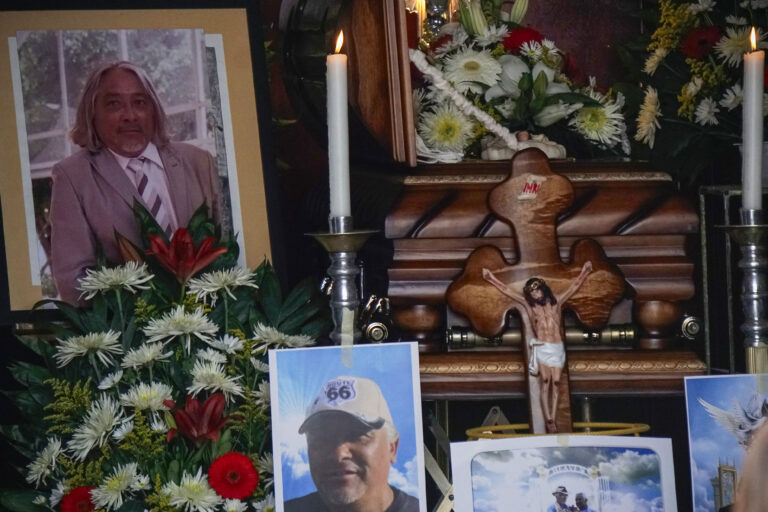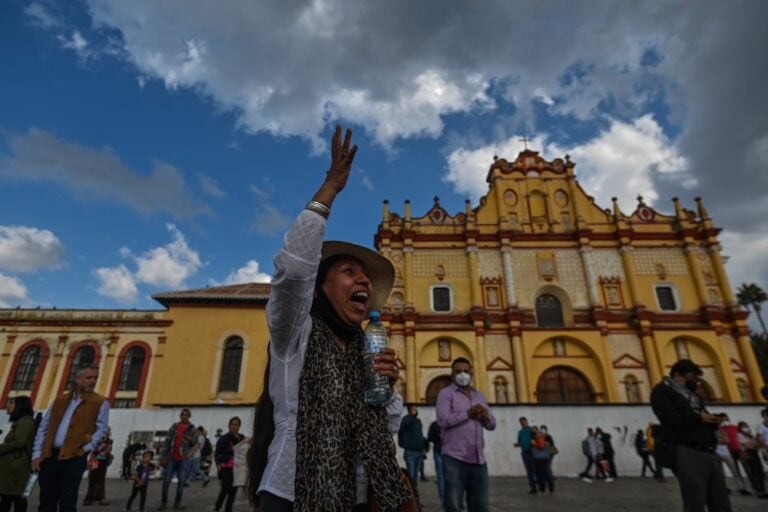(CPJ/IFEX) – The following is a 10 February 2004 CPJ letter to Governor of the State of Sinaloa Juan Millán: February 10, 2004 Juan S. Millán Governor of the State of Sinaloa Palacio de Gobierno Culiacán, Sinaloa Via facsimile: +52-667-714-5722 Dear Mr. Millán: The Committee to Protect Journalists (CPJ), a New York-based independent, nonprofit organization […]
(CPJ/IFEX) – The following is a 10 February 2004 CPJ letter to Governor of the State of Sinaloa Juan Millán:
February 10, 2004
Juan S. Millán
Governor of the State of Sinaloa
Palacio de Gobierno
Culiacán, Sinaloa
Via facsimile: +52-667-714-5722
Dear Mr. Millán:
The Committee to Protect Journalists (CPJ), a New York-based independent, nonprofit organization that works to safeguard press freedom worldwide, is deeply concerned about Mexican journalist Irene Medrano Villanueva, who has been threatened and harassed during the last two months in connection with her journalistic work.
Medrano, a reporter with the daily El Sol de Sinaloa, based in the state capital of Culiacán, in the northwestern state of Sinaloa, received several death threats after she wrote a series of reports on the proliferation of child prostitution in Culiacán.
From August to October 2003, Medrano wrote a series of reports alleging that some local brothels and massage parlors were employing minors and criticizing local municipal authorities for not going after brothels and massage parlors that employ minors.
On December 6, 2003, Medrano published the series’ last report, claiming that minors were being recruited in public and private schools to work as prostitutes. Her stories contained testimony from the victims and information from the National System for the Integral Development of Families, the government agency for the protection of minors and families, which also criticized local authorities for not taking action against the abuses.
The same day the last report was published, the threats began. An anonymous caller phoned the newspaper and told a security guard that Medrano was going to die. Later that evening, an anonymous man called the journalist at her home and told her that she had signed “her death sentence.”
On December 8, 2003, after finding that the word “death” had been painted on her car, Medrano filed a complaint with the Sinaloa Public Prosecutor?s Office (PGJE). That evening, an anonymous caller phoned the journalist at home and told her that she was an informer who had caused her own death sentence. The PGJE then assigned Medrano a police agent to escort and protect her for five days.
On December 13, 2003, while Medrano was driving to work in the company of the police agent, a car without license plates came from behind, hit her car three times, and fled. On December 14, after discovering that her car’s windshield had been smashed, she called the state police, who inspected her car the next day to search for evidence. Medrano was again assigned a police agent.
Feeling pressured, Medrano told CPJ, she then took a few days off from work. While she was driving to return to work on December 28, 2003, Medrano tried to stop in front of a stop sign, but her brakes did not respond and, as a result, she crashed into a taxi. She then took her car to an auto shop, where a mechanic told her that her car’s brake lines had been tampered with.
In early January 2004, the threatening phone calls intensified. On January 8, PGJE agents installed caller ID and a recording device on her home phone to trace the threatening calls. On January 12, after an initial call from a public telephone, another threatening phone call was registered. According to Medrano, PGJE agents told her that the calls came from the office of Jesús Enrique Hernández Chávez, the mayor of Culiacán. Because the investigation into the threats is still in its preliminary inquiry phase, the PGJE is not allowed to disclose any information except to the parties involved.
On January 16, Medrano denounced the threats in a press conference she held with the support of Sinaloa’s two main journalists’ associations. According to the Mexico City daily El Universal, on January 19 Hernández Chávez came to the PGJE offices in Culiacán to deliver his testimony in writing regarding the threatening phone calls made from his office. The mayor is not a suspect in the investigation, but officials have questioned him since the calls originated from his office, according to local news reports. The Sinaloa newspaper Noroeste reported that Mayor Hernández Chávez has called for a thorough investigation and for those responsible for the threats to be punished. He has also expressed his support for Medrano’s work, according to Noroeste, but has not made any statement to the press regarding the incident, saying he refuses to speculate.
Nonetheless, the threatening phone calls have continued, and Medrano’s car was tailed by another car in late January, the journalist said last week.
Medrano has been targeted for reporting on a matter of public interest. Because state authorities are handling this case, we urge you, as the governor of Sinaloa State, to launch an investigation into the death threats against Medrano and to ensure those responsible are punished to the full extent of the law. We further call on you to ensure that all journalists in Sinaloa are able to conduct their work without fear of reprisal.
Sincerely,
Ann K. Cooper
Executive Director
CC:
Vicente Fox Quesada, President of Mexico
Óscar Fidel González Mendívil, Attorney General of the State of Sinaloa
Rafael Macedo de la Concha, Attorney General of Mexico
Juan José Bremer Martino, Mexican Ambassador to the United States
Antonio O. Garza, Jr., U.S. Ambassador to Mexico


